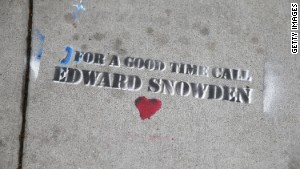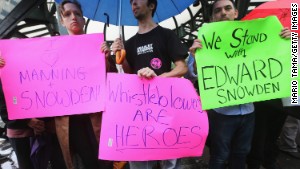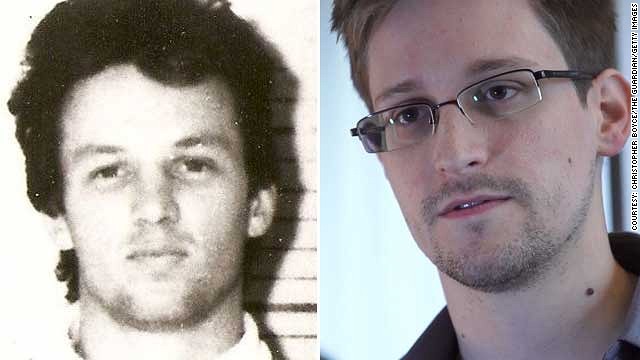Convicted U.S. spy Christopher Boyce: 'Snowden is doomed'
updated 6:26 AM EDT, Fri June 14, 2013
Christopher Boyce, left, was jailed for 40 years in 1977 for espionage. He says he pities Snowden.
STORY HIGHLIGHTS
- Former spy and fugitive Christopher Boyce sold U.S. state secrets to the Soviets in the 1970s
- On the run for two years, he was eventually arrested and jailed for 40 years for espionage
- Out on parole in 2003 after serving 25 years, he is currently writing his memoirs
- He says NSA leaker Edward Snowden is 'doomed' and has entered a world where he can trust no one
Editor's note: Convicted spy Christopher Boyce was jailed for 40 years for espionage in 1977 after selling U.S. secrets to the Soviet Union. In 1985, his story was turned into a Hollywood film -- "The Falcon and the Snowman" - starring Sean Penn and Timothy Hutton. Released in 2003, Boyce is currently working on his memoirs "The Falcon and The Snowman: American Sons."
(CNN) -- Sitting alone in a hotel room, unable to contact friends or family or even walk the teeming streets of Hong Kong without looking over his shoulder, there can be few who can claim to know the fear and isolation that NSA leaker Edward Snowden is living through.
One man, however, is better qualified than most.
Former spy, fugitive and convicted traitor, Christopher Boyce sold U.S. secrets to the former Soviet Union and dodged U.S. authorities for almost two years until his arrest in 1977 at the age of just 22.
Young, idealistic and driven by a mixture of political conviction and outlaw excitement, Boyce eventually received a 40-year sentence for espionage. In 1980, he escaped from the federal penitentiary in Lompoc, California and, while on the run, carried out a string of bank robberies in Idaho and Washington state -- crimes for which he says he carries a greater weight of remorse than for those of espionage.
Released on parole in 2003 after serving 25 years, Boyce now lives on America's West Coast and is working on his memoirs -- "The Falcon and The Snowman: American Sons" -- scheduled for release this year.
While Edward Snowden's leaks allege that U.S. intelligence has been hacking networks around the world for years, the NSA's stated position is that the administration, Congress and the courts are all aware of and have oversight of the NSA programs exposed by Snowden. NSA has also rejected his claims they can tap into the phone or computer of any U.S. citizen, saying that legally obtained phone records have helped to thwart "dozens" of terrorist events.
In it he outlines how, in 1974, a clean-cut college kid -- the son of a respected former FBI agent -- lands a job at aerospace and defense firm TRW in Southern California where he sees misrouted Central Intelligence Agency cables that allegedly discuss destabilizing the Australian government -- then led by the center-left government of Gough Whitlam.
Whitlam's government was famously and controversially deposed in 1975 in what some argue amounted to a constitutional coup d'etat. The then governor-general, the British queen's representative in Australia, Sir John Kerr -- who occupied a largely ceremonial office -- invoked the rarely-used queen's reserve powers to fire a democratically elected government to resolve a long-standing political deadlock in the country.
According to accounts by Boyce, the governor-general was casually referred to in CIA circles as "our man, Kerr."
Only a few years earlier, Australia had been a key U.S. ally in the Vietnam War and Whitlam's government had already raised ire in Washington by withdrawing Australian troops within hours of taking office in 1972.
By 1975, the Whitlam government was asking uncomfortable questions about key U.S. military installations based in Australia and Boyce claims that the CIA had the Whitlam government firmly in its sights.
Appalled that the U.S. secret services would use its powers of surveillance and secret influence to depose the government of a U.S. ally, Boyce teamed up with a childhood friend -- Andrew Daulton Lee -- and embarked on a journey that made them one of the Cold War's most infamous spy teams.
The slow descent of the two former altar boys into a world of mistrust, madness and cold isolation was turned into a Hollywood hit for Sean Penn and Timothy Hutton, who starred in the 1985 movie "The Falcon and The Snowman."



While 35 years separate his ill-starred foray into espionage and Snowden's decision to reveal the secret surveillance plans of the National Security Agency (NSA), Boyce told CNN he has a good idea what Snowden might be going through.
"I feel for the guy, and for what his life is going to become. I pity him," Boyce said.
"He's in for a world of hurt, for the rest of his life. I feel sorry for him. He's going to go through life not being able to trust anybody. And I think that in the end, it'll end badly for him -- one way or another, they'll get their hands on him. He's going to pay for it. He's doomed."
In one of only a handful of interviews Boyce has given since his arrest in 1977, he told CNN this week about his own motivations three decades ago and what Snowden is likely to face psychologically now he is pitted against the world's most powerful secret service.
CNN: When you see Snowden on the television, do you immediately recognize your situation in it?
Christopher Boyce: The major difference between Snowden and myself is that I didn't come out publicly with my information. Also, my motives were different. I was sworn to revenge. It certainly was a far different time and place. Up to that point in my life, my view of the (U.S.) Federal Government was that it had only gotten worse.
I grew up in a different time -- watching the Kennedy assassination, watching the race riots on television, and watching the U.S. government slide into the Vietnam War -- which was, to me, just about the most idiotic, stupid, evil exercise of power my country had ever pulled off.
I went to work as a contractor for the NSA, like Snowden, and what I discovered on the "twixes" (telex messages that were sent back and forth from U.S.-based CIA locations and CIA outposts in Australia) showed that we were undermining the government of Australia, an ally nation.
I don't know if Snowden views the U.S. government in the same way that I did -- maybe he does. He's uncovered things and made things public that sound, to me, as if they're illegal. Things that show the NSA and the CIA are lying to Congress. Perhaps in a way it is similar. But what Snowden has done is much different. My aim was to hurt the United States government. I suppose he's doing that too, but in a public way. Yet he's not as underhanded about it as I was.
CNN: In the light of his situation, what do you think he could be going through?
One way or another, they'll get their hands on him. He's going to pay for it. He's doomed
Christopher Boyce
Christopher Boyce
Boyce: I think he's scared to death. I think that every single person he sees, he's wondering if that's the person that's coming for him. He's probably worried that there is a large group of people in Washington, D.C., trying to come up with some way of getting back at him, to get control of him, to lock him up for the rest of his life.
I don't know if he has an arrangement with the Chinese government. If he doesn't, I would be worried that the Chinese may deport him to the United States to gain some concession in return. I'd be terrified of that, if I were him. Who would trust the Chinese government? He is utterly vulnerable and knows that there are a lot of people who really want to hurt him now. If I were him, I would at this point probably be having second thoughts. Asking myself "What did I do? What have I brought down upon my head? Did I really do this?"
The fact is, he can never come back home.
He's totally separated from everything he has ever known, from his family. He is always going to be a fugitive, until they get him. And eventually, they will. He will never see his family again unless they go to him. And if they do go to him, he'll no longer be in hiding. The only way that he can truly hide is to abandon his whole past, his entire life.
When he realizes that, he's going to be racked with depression. I would imagine that his stress levels are at a point where they could actually make him physically sick. I'm sure everything is gnawing at him. And he's isolated. If I were him, I'd latch onto a couple of reporters that I trusted. He has a lot of enemies now. He has the whole intelligence community of the United States after him, including all of its allies. I sure as hell wouldn't trust the Chinese government, if I were him.
CNN: At what point, in your case, did you realize there was no going back? Were you fully aware, at the time, of the scope and depth of the trouble you would be in?
Boyce: I realized immediately that there was no stepping back, that I was doomed, and that my life would never go back to the way it was before. I was surrounded by an impending sense of doom, knowing this was something that could not end well. I imagine he will probably start drinking heavily. That's what I did. Think of it: How much bigger trouble can you possibly get into? How could you make more enemies, more people who would like to kill you, than by doing what he has done? He's got to be having second thoughts about it. He has to go someplace where he's safe, and I don't know if China is it.
CNN: To what extent were you motivated ideologically and to what extent were you motivated by the excitement of being an outlaw? In your opinion, how much ego is involved in the whistleblower's mindset?
I imagine he will probably start drinking heavily. That's what I did. Think of it: How much bigger trouble can you possibly get into?
Christopher Boyce
Christopher Boyce
Boyce: Edward Snowden is 29. I was 21. At that age, I felt indestructible. Nothing bad could ever happen to me, or so I thought. You just don't think about these things when you're young. You believe that bad things happen to other people. But you learn, after a while, that that's not true.
My view of the government at the time was that it was just a monstrosity that was getting worse and worse. I didn't like it. I was motivated to hurt the government. I was nuts. I thought I was going to wage a one-man war against the Federal Government and that I was going to make them pay for all the rotten things they had done and were still doing.
Ego played a great part in that -- having my own secrets, being in the know of something, getting (one) over on the bastards. It's an all-empowering feeling, in a somewhat demented way. But what you're really doing is just walking into a buzz-saw. It certainly was exciting. I'm sure Snowden feels a similar excitement. But that excitement, after a while, is not a good excitement -- it becomes terror.
CNN: Considering the minimal amount of damage the information that you sold to the Soviet Union caused, do you think your sentence was out of all proportion with the crime you committed? There is a sense with these whistleblower cases that the leaker has stepped into a zone where normal laws no longer apply. Do you think the secret services are more interested in exacting revenge in the cases of Assange and Manning than in protecting the interests of the state they serve?
Boyce: Regarding my sentence for espionage, I don't know if the punishment was disproportionate. That's for someone else to decide. Of course, I'm a bit prejudiced on that. I certainly think they decided to make an example out of me. There were very few espionage arrests before I was arrested. People never went to court -- the government didn't want these things brought out. In my situation, however, they decided to make an example. And then I escaped from Lompoc federal penitentiary for 19 months. And then I decided to rob some banks. I can say that the sentence I was given for bank robbery was certainly just.
Do I think the government wants revenge against Snowden? Absolutely, they want revenge. They want to ensure anyone who even thinks about doing what he did does so with fear in their hearts.
With respect to these agencies wanting to protect the interests of the states they serve, I ask this question: Is it in the interest of the United States and the American people to have billions of their communications secretly monitored by a government? And to have Congress lied to about it? I don't think that's in the interest of the American people. Is the interest of the United States government the same as the interest of the American people? Not always. Not in this situation, anyway.
Of course, there's still a lot that has to be played out. But I think that revenge is the key driving force by those individuals who stand to get into a heap of trouble as a result of these secrets being made public -- the big shot bureaucrats in the national intelligence community. Not that it's in the interest of the American people to be kept in the dark about it, but simply because of the repercussions those individuals behind the scenes could face. They could be retired early, or lose their pensions, or be disgraced, or be hauled in front of Senate subcommittees, or all manner of bad things. I'm sure there are many things the NSA and CIA don't want the public to know about, principally because the players behind the scenes could get into serious trouble if it became known.

No comments:
Post a Comment